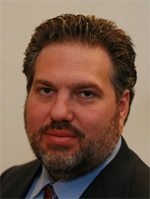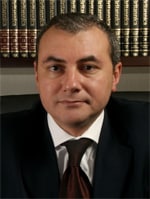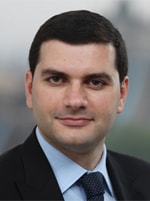By Gordon Platt
BEST FOREIGN EXCHANGE PROVIDERS: REGIONAL WINNERS
NORTH AMERICA
Citi
 |
|
Feig, Citi: We have invested in people and technology and are seeing our market share rise as a result |
As Citi prepares to celebrate its 200th anniversary in 2012, it has an unrivaled global footprint. The bank is one of the largest FX providers in the world, with more than 1,500 currency trading and sales professionals in 83 countries. Jeff Feig, managing director and global head of G10 foreign exchange at Citi, says: “We have invested in people and technology and are seeing our market share rise as a result.”
Citi created an Exposure Management module that combines risk and market-analysis tools with research and information on areas such as options strategies, accounting standards, and best practices for hedging. Linked with clients’ treasury management systems, the module enables clients to track their global cash flow and balance-sheet exposures. It also allows them to determine if the hedges they have put on globally across subsidiaries are in line with their corporate hedging policy and provides access to innovative hedging models.
WESTERN EUROPE
Deutsche Bank
Deutsche Bank, the biggest bank in Germany, has expanded its Western European presence in recent years. It acquired parts of ABN Amro’s commercial banking activities in the Netherlands and purchased Deutsche Postbank for $8.9 billion, in its largest takeover in a decade. The acquisition of Postbank doubled the number of Deutsche Bank’s retail customers in Germany and added about 1,100 branches.
With its large balance sheet and expertise in derivatives, Deutsche Bank has taken advantage of volatility in the euro to increase its FX business with corporations seeking to better manage their currency exposure. The bank offers customized solutions that include options in addition to forward contracts.
In June 2011, Deutsche Bank launched five exchange-traded funds (ETFs) linked to currency-hedged MSCI international indexes. The ETFs invest in foreign stocks and also hold foreign currency contracts in order to reduce the funds’ exposure to declines in the value of the currency in which the equities are denominated.
Deutsche Bank reported a profit of $1.1 billion in the third quarter of 2011, compared with a loss in the same period a year earlier. The bank wrote down $250 million related to holdings of Greek bonds in the quarter.
ASIA-PACIFIC
Standard Chartered
Standard Chartered, the UK-based bank with extensive emerging markets operations, continues to be the leading FX market maker across the Asia-Pacific region. With more than 150 years of history in Asia, it has the appetite to quote local currency products and manage substantial client risk, due to its deep understanding of local markets. Standard Chartered offers a full range of products and services in Asian foreign exchange markets.
The bank was at the forefront of developing the offshore renminbi market in Hong Kong. It was the first to create and distribute an offshore renminbi-denominated structured investment product linked to foreign exchange and rates.
Standard Chartered has also developed FX options solutions designed to help offshore clients with renminbi payables to offset the risk of further revaluation in the currency without facing negative carry in the event of a slowdown or halt in its appreciation. Such product innovation has enabled the bank to attain a share of nearly 50% of the market for renminbi FX options. Standard Chartered provides FX solutions that denominate underlying trade flows in the home currency of the customer to reduce costs and increase efficiency.
AFRICA
Standard Bank
 |
|
Kok, Standard Bank: Our African roots and physical onshore presence enable a deeper understanding of local market dynamics |
Standard Bank is not only the leading foreign exchange provider in its home market of South Africa—with a 30% market share—but it also has a network that spans 17 African nations and 13 countries outside of Africa. The group has more than 1,000 branches on the African continent and is present in such key global financial centers as London, New York and Hong Kong.
“Standard Bank Group’s African roots and physical onshore presence enable a deeper understanding of local market dynamics and the various regulatory frameworks within which we operate,” says SJ Kok, head of global markets sales, Africa.
Its strategic relationship with Industrial and Commercial Bank of China—which holds a 20% share of the African bank—gives it an advantage in facilitating trade and foreign exchange flows between China and Africa. Clients involved in cross-border trade with China can denominate their transactions with China in renminbi. “In the foreign exchange business, our risk appetite in Africa is a true differentiator,” Kok says.
MIDDLE EAST
Ahli United Bank
 |
|
Gamal, Ahli United Bank: AUB is present and active in four out of the six GCC countries, as well as the UK, Egypt, Libya and Iraq |
Ahli United Bank, based in Bahrain, has enjoyed steady growth in its foreign exchange business in recent years. “AUB prides itself on meeting clients’ needs on a truly regional basis, being present and active in four out of the six GCC [Gulf Cooperation Council] countries, as well as the UK, Egypt, Libya and Iraq,” says Bassel Gamal, senior deputy group CEO—banking group. “The breadth and depth of our treasury offering make us the provider of choice in the Middle East, acting as a provider of liquidity to our international interbank counterparties and market maker for the rest of the group.”
Ahli United Bank is a major market maker in the Bahrain dinar and provides daily commentary to its corporate customers on the international and regional markets. It advises on structured hedging solutions and proprietary trading ideas. It offers an Islamic FX swap product through Al Hilal, its Islamic branch in Bahrain. The bank offers a shariah-compliant tool to hedge cross-border currency exposures.
LATIN AMERICA
Citi
Citi has a broad geographic presence in Latin America, where it has operations in 24 countries, more than any other bank. It has a leading market share in spot and forward currency transactions, as well as options in local currencies in the region.
Technology is a key driver for growth at Citi. Designed for corporate traders, CitiFX Pulse provides custom-built end-to-end solutions that comply with local regulations and market conventions in each country in the region. Multinational clients are able to view all transactions done by their various subsidiaries throughout Latin America. Citi Velocity, which is for professional FX traders and smaller institutions, offers executable streaming prices in more than 150 currency pairs in spot, forward and swaps transactions. Close to half of Citi’s tickets are now closed electronically.
“Citi’s continued recognition in these prestigious awards, both at a regional and country level, distinguish the sustained efforts made to deliver the best solutions to our clients,” says Flavio Figueiredo, head of corporate derivatives sales for the Americas and head of FX sales for Latin America.
By combining the global perspective from its trading hubs in New York, London and Singapore with the local insights from its onshore trading desks across Latin America, Citi is able to provide the bank’s more than 12,000 FX customers in the region with in-depth execution and advice.
SOUTHEAST ASIA
DBS
 |
|
Soh, DBS: Our vision and long-term strategy is to grow market share and expertise in Asian currencies |
Within Singapore and the Southeast Asia region, DBS commands an estimated 20% market share in the foreign exchange market. DBS has been the largest market maker in the Singapore dollar for many years. Most recently, it located a currency trading team in Vietnam, where it opened a branch in 2010.
Peter Soh, managing director and head of FX trading at DBS, says: “Our vision and long-term strategy is to build on this foundation and presence to grow our market share and expertise in Asian currencies.” DBS is an active market maker and a major FX market participant in the region, providing liquidity for sizes and tenors where few banks are able. By tapping into DBS’s onshore presence in Indonesia, South Korea, India and Taiwan, the bank is able to provide competitive prices for tenors of up to two years to corporations and financial institutions. DBS has also helped develop a second offshore market for the Chinese currency in Singapore. DBS has introduced many innovative products linked to this market, including time deposits, currency-linked investments and structured notes.
NORDIC COUNTRIES
SEB
 |
|
Alpen, SEB: Our multi-asset-class prime brokerage provides clients with consolidated settlement, clearing and reporting |
SEB takes the crown as the leading foreign exchange bank in the Nordic region and global market maker in the Swedish krona, the Danish krone and the Norwegian krone. Indicative of its global reach, SEB is also one of the first banks to offer a full range of services in China’s overseas renminbi. With more than 200 dedicated employees in foreign exchange, SEB provides FX services in 15 financial centers—including Hong Kong, which opened last year.
Founded 155 years ago, SEB serves a majority of the largest multinational corporations and financial firms in the Nordic countries. It is the only bank in the region to offer FX prime brokerage and an open-architecture technology platform. Joachim Alpen, global head of foreign exchange at the Stockholm-based bank, says: “Our multi-asset-class prime brokerage capability allows clients to benefit from consolidated settlement, clearing and reporting that is consistent across asset classes and reduces margin requirements and carry costs derived from cross-product netting,” The bank’s cash-flow hedging tools enable corporate treasurers to manage their entire FX exposure in real time.
CENTRAL & EASTERN EUROPE
Société Générale
 |
|
Zaffran, Société Générale: In addition to our execution capabilities in CEE currencies, our market-risk advisory team offers hedging solutions and advice on strategy |
Société Générale has a strong network in Central and Eastern Europe and is a leading dealer in many regional currencies, including those of Russia, Poland, the Czech Republic, Romania and Bulgaria. SG Corporate and Investment Banking has completed the build-out of its CEEMEA corporate foreign exchange initiative and is now winning recognition for its fixed-income and currencies platform, says Christophe Couette, co-global head of flow, fixed-income and currencies. Having a global platform and a local presence in the CEE is a differentiating factor for the bank, he says. “The global-local model works well for us, as it is a real added value for our clients,” he says.
The bank has invested in its foreign exchange operation by hiring FX traders and sales people who work in synergy with the bank’s staff covering the region. Altogether, SG owns 18 banks in the CEE region, which gives it good access to liquidity in local currencies.
Majority-owned BRD–Groupe Société Générale is the second-largest bank in Romania, with a nationwide network of branches. Société Générale Expressbank is a leading bank in Bulgaria. Other affiliate banks include Komerní Banka in the Czech Republic, Euro Bank in Poland, SKB Banka in Slovenia, Splitska Banka in Croatia, and Société Générale Srbija in Serbia. Société Générale is present in Russia through Rosbank. SG also has operations in Belarus, Georgia, Macedonia and Moldova.
“Our FX research has a specific focus on CEE currencies, and we have economists based in these countries who provide local insight,” says Marc Zaffran, managing director and co-head of CEEMEA corporate sales. “In addition to our execution capabilities in CEE currencies, our market-risk advisory team offers hedging solutions and advice on strategy,” he says.




